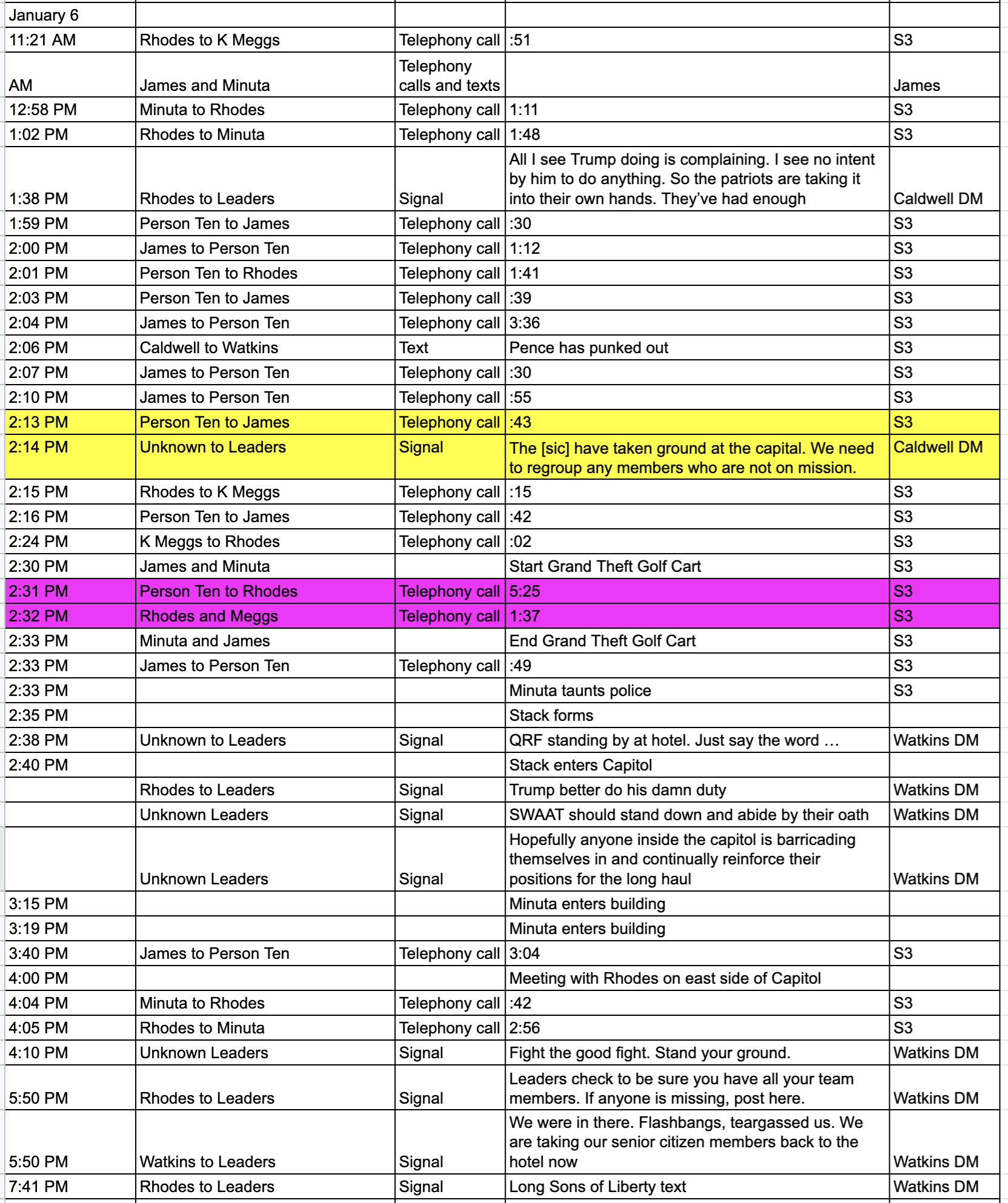Joshua James’ Frequent January 6 Updates on His Jilted VIPer
The other day, Kenneth Harrelson invented a premise to publish the 302s from Mike “Person 10” Simmons, the Oath Keepers’ still-uncharged field commander for January 6.
In a response (technically a surreply), AUSA Kathryn Rakoczy made it clear the government believes Simmons was being dishonest. She provides several data points to demonstrate that, contrary to what he told the FBI, Simmons was well aware about the breach of the Capitol … which raises questions why he hasn’t been charged, yet.
Person Ten, as an uncharged individual who was aware that others have already been charged, had a motive to downplay or disregard both his own involvement and any preplanning efforts. And documentary evidence contradicts Person Ten’s blanket denials. For instance, on October 8, 2021, the government disclosed a Signal chat thread named “Jan 5/6 DC Op Intel team,” which included Person One, Person Ten, codefendant Joshua James, and about seven other individuals. On the Signal thread, shortly before 2:00 p.m. on January 6, a participant posted a video titled “live stream of patriots storming capital.” Another participant asked, “Are they actually Patriots – not those who were going to go in disguise as Patriots and cause trouble[?]” Person Ten authoritatively answered, “[T]here [sic] patriots.” Person One added, “Actual Patriots. Pissed off patriots[.] Like the Sons of Liberty were pissed off patriots[.]” Codefendant Joshua James followed with, “Were coming to Capitol ETA 30 MIN[.]”
The Sixth Superseding indictment alleges that at 2:14 p.m. on January 6, Person Ten informed the “DC OP: Jan 6 21” Signal chat that “The[y] have taken ground at the capital,” and, “We need to regroup any members who are not on mission[.]” ECF 513 ¶ 125. At 3:05 p.m.— twenty minutes after Defendant Harrelson and other codefendants breached the Capitol, and ten minutes before Defendant James and his second wave of coconspirators breached the same doors—Person Ten also messaged another individual, “Were [sic] storming the capital.”
Particularly given the confirmation that the government believes he was lying, I’d like to point to some redacted references to a VIP that Joshua James was guarding who was bitching that he wasn’t getting VIP treatment.
This is likely Roger Stone. That’s true because — as Dan Friedman reported — James was “guarding” Stone that day (and Simmons guarded Stone the previous day), the name seems to fit, and Stone has publicly complained about his treatment that day.
While exchanging calls with Simmons, James traveled from the Willard Hotel, in downtown Washington—where he had been leading a security detail guarding Stone—to the Capitol.
What appears to be the first reference to this person also seems to fit the name, which would be the full name, Roger Stone, on first reference. Roberto Minuta, Jonathan Walden, and the now-cooperating Mark Grods were also guarding Stone.
Which brings us to the middle reference. Simmons claims that James called him every time his VIP moved.
Only, if that VIP was Roger Stone, he didn’t move. By his own account he stayed at the Willard before taking his bruised ego and leaving town.
If that’s right, it means Simmons was trying to explain multiple calls with James, and to do so, he offered the bullshit excuse that Stone, who by his own account never left the Willard, kept moving.
These calls are earlier than the ones that the indictments disclose. They would effectively serve to warn Roger Stone of this investigative interest.
But they also suggest that the Oath Keepers were keeping their operational lead closely informed of what some VIP — likely Roger Stone — was up to at the Willard that day.
Update: Way back in April — April!! — I argued that Person Ten — Simmons — played the role of a communication pivot that day, including at one point seemingly being on a 3-way call with Rhodes and Kelly Meggs.
Highlighted in yellow, Person Ten has a series of calls back and forth with Joshua James, pre-Golf Cart Grand Theft. Right in the middle of it all, someone — not described in this indictment — informs the Signal group as a whole that “the[y] have taken ground” and “we need to regroup any members who are not on mission.” Shortly thereafter, James and Minuta launch the Grand Theft Golf Cart to get to the Capitol, where Minuta taunts the police, preventing them from moving to reinforce the overrun Capitol on the other side, and the members of The Stack leave Trump’s speech prematurely and go to the Capitol. That is, Person Ten calls for reinforcements (Rhodes repeats his Signal text), and then Minuta and James in the golf carts and The Stack converge on the northeast side of the Capitol to breach a new entry point.
Now consider the pink highlight: Unless the government or I have made a mistake in the timing, Person Ten and Kelly Meggs are both on the phone with Stewart Rhodes together. Because of the length of Person Ten’s calls, it overlaps entirely with Rhodes’ call with Meggs (which — again, unless there’s an error of timing — means Rhodes either has two phones or either via conferencing or a hold, had both on the same phone at the same time).
In either case, Person Ten seems to have a key role as a communication pivot between different groups of Oath Keepers.
The calls that Harrelson — as a Floridian, someone with ties to Stone — revealed predated all these, to a period when Stone was at the Willard and everyone else was at the Ellipse.



